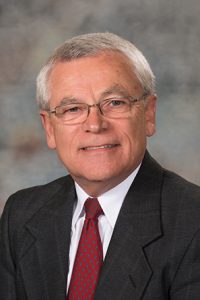Repeal of state immunity against child sexual abuse claims proposed
A bill intended to create parity in public and private sector liability for child sexual abuse claims was heard by the Judiciary Committee Feb. 9.

Current Nebraska law provides sovereign immunity to the state and its political subdivisions against child sexual abuse claims made against its officers, agents or employees. LB1200, introduced by Hastings Sen. Steve Halloran, would allow those entities to be held liable for such claims to the same extent a private individual or entity would be under like circumstances. In addition, child sexual abuse would not be subject to the limitations or requirements of the State Tort Claims Act.
Under LB1200, a victim of child sexual abuse could bring a civil action against a perpetrator without a statute of limitations for cases occurring after the bill’s effective date or for previous acts that were not time barred.
Halloran said child sexual abuse is a “plague” that takes place in public institutions such as schools, the child welfare system and the juvenile justice system, as well as in the private sector.
“While child sexual abuse is prevalent across society including private and public institutions, our laws fail to provide justice and equity and fairness to all victims,” Halloran said. “Nebraska law provides rights to certain victims while denying rights to other victims.”
LB1200 would treat all victims equally when it comes to holding a third-party public institution responsible for their wrongful actions, he said.
Several testifiers spoke in support of the bill and shared the experiences of children who were sexually abused at a public school or by a public servant but were unable to take civil action against those entities due to the state’s immunity.
Also in support of LB1200 was attorney Cameron Guenzel of Lincoln. The bill is not a question of budget concerns or balancing competing interests, he said, but rather an “inescapable, fundamental duty to safeguard children.
“To oppose this bill, one must believe that public institutions are less capable of safeguarding children from rapists than at a private school or … institution, or that public institutions should escape the consequences when they fail to protect children,” Guenzel said.
In opposition to the bill was Chuck Wilbrand, who testified on behalf of the Nebraska Association of School Boards.
“This bill creates a new liability for political subdivisions and school districts under a negligence standard that has never been recognized before,” he said. “It’s also broad enough that this bill could create liability for school districts for any sexual assault that occurs on their premises even if it’s not done by an employee or student.”
Jennifer Huxoll also testified in opposition to LB1200 on behalf of the Nebraska Attorney General’s Office. Sovereign immunity is a core principle that allows the state to govern in many areas without the threat of lawsuits, she said, and at the core of any sexual abuse case is an individual perpetrator who is responsible for the assault.
“I don’t want our comments to be misinterpreted as a lack of care about that issue,” Huxoll said. “The question is just, essentially, whether or not the perpetrator will be responsible for [the crime] or if the state is deliberately indifferent and looks the other way.”
If a state actor is deliberately indifferent, a victim has other remedies under federal law, Huxoll said.
Bo Botelho, general counsel for the state Department of Health and Human Services, testified in opposition to the bill. He said extending the statute of limitations for future cases likely would result in an increase in litigation and potential liability.
“Extending the limitation period would make it much more difficult to defend [against] such claims,” Botelho said. “Witnesses’ memory and relevant facts would fade and witnesses may no longer be available to testify.”
The committee took no immediate action on LB1200.

